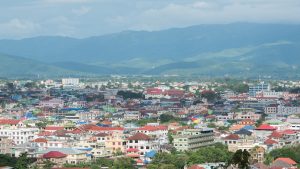Human trafficking and scam compounds are sowing further rifts within the Association of Southeast Asian Nations (ASEAN) after Laos effectively undermined attempts by Thailand to deny the criminal syndicates access to electricity supplies in Myanmar where they have flourished with impunity.
Within 24 hours of announcing the cuts to Tachileik, Thai media said the city in eastern Myanmar was already transitioning to electricity provided from Laos, with half its needs met by Wednesday night and the remaining 50 percent to be made available over the following three days.
It was a dreadful look for ASEAN, a bloc that is already divided over issues like the South China Sea and how to resolve the civil war in Myanmar. Laos then sought to allay any fears by saying its commitment to combating transnational fraud has never wavered.
The statement, made by Lao Minister of Energy and Mines Phoxay Sayasone to Chinese Ambassador to Laos Fang Hong, was odd. It confirmed that electricity is being delivered into Tachileik but that this would be limited to supporting people’s livelihoods and not for “crimes such as fraud.” But such selective power distribution from one country to another is just not doable.
Meanwhile, sources in the Myanmar town of Myawaddy, on the Thai border near three scam-cities, said energy shortfalls were being met by criminal syndicates, which dispatched couriers across the border to the Thai city of Mae Sot, where they were buying up generators and smuggling diesel.
“Smuggled diesel is selling for about 62 baht a liter (about $2) that’s up about 20 percent here and double the price in Thailand,” the source, aligned with the rebel People’s Defense Force, told The Diplomat. “Regular people can’t afford to pay that and they have no electricity.”
Last week, Thai authorities initiated power cuts to three Myanmar border cities in a crackdown on online scam centers after Chinese tourists abandoned Thailand amid a furor over last month’s abduction of the actor Wang Xing, 22, who was conned and trafficked.
He was rescued from Shwe Kokko, about 20 km north of Myawaddy, where his head was shaved and he was forced to run online scams, on January 7. China’s leader Xi Jinping met with visiting Thai Prime Minister Paetongtarn Shinawatra in Beijing late last week, and vowed to crack down on the criminal syndicates.
But such promises have been made before with little or no effect as scam compounds in Southeast Asia rake in almost $64 billion a year through human trafficking and online fraud, known as pig-butchering. They operate with impunity from parts of Myanmar, Cambodia, and Laos.
Back in early 2022, ASEAN member states Vietnam, Malaysia, and Thailand, as well as Pakistan and China, all issued warnings to Cambodia to shut down its “slave compounds,” which had flourished during the COVID-19 pandemic.
Cambodia failed on promises to end the scourge by year’s end, and the syndicates expanded into Laos and Myanmar, forming an epicenter that, according to the United States Institute for Peace, “is rapidly evolving into the most powerful criminal network of the modern era.”
Myanmar, Laos, and Cambodia each hold the critical assets needed to exploit a human trafficking and scam compound operation, including isolated lawless pockets, compliant local authorities, and ample office space for tens of thousands of tech-savvy people. Add to the recipe town water, sewage, sleeping quarters, internet and electricity, access to food, and proximity to an international airport.
Sihanoukville on Cambodia’s south coast inherited that in abundance after a Chinese exodus during COVID-19 left behind a few thousand unsavory types amid a thousand empty buildings and a handful of casinos and online gambling operations with sophisticated communications links to the outside world.
That type of infrastructure was also available along Myanmar’s borders with Thailand and there’s the added advantage of civil war, which denies access to all except those tricked or trafficked across the Moei River into compounds like Shwe Kokko and its ilk.
ASEAN’s mantra that its 10 members refrain from interfering in each other’s affairs is a time-honored excuse to do nothing, even when most of the victims are from ASEAN countries. It’s also a curse that has tied diplomatic relations with China up in knots.
Frustrations are palpable but a calculated decision by Laos to sell electricity into Myanmar, undermining Thailand’s efforts to crack down on scam compounds and then try to justify it is breathtaking even by ASEAN’s dismal record in combating organized crime.

































